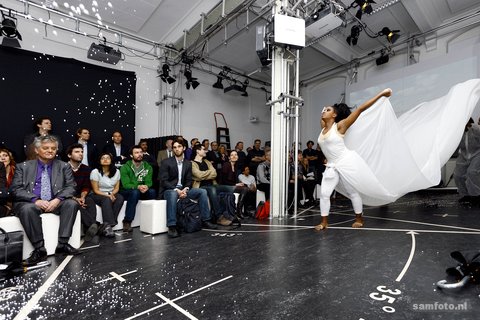In the presence of some 90 scientists, businessmen and journalists, the TU Delft Climate Institute was officially opened on the 1st of March. The president of the new TU Delft Climate Institute, Professor Herman Russchenberg, was thrilled to announce the opening of an institute that combines all climate-related research at TU Delft into one unified activity.
The opening ceremony was held at the Science Centre, the impressive and historic former geology and mining faculty building. In this climate institute, all TU Delft research dealing with the combination of data and climate will be brought together, with the aim being to promote cooperation between different fields of research related to climate. Scientists from various faculties within the university will work together. This combination of knowledge will make it possible to answer more climate-related questions and devise more solutions to the climate change issue. “This makes it clear that the essence of the institute is collaboration,” says Prof. Russchenberg. “The climate system is a complex issue, which needs to be tackled from different angles and disciplines”.
Following the opening ceremony, which featured a dance based on the framework of climate change, the four main themes for 2012 were introduced: extreme weather and the city; aerosols, radiation and clouds; observation and validation of sea level rise; and climate information and policy. These presentations were followed by a panel discussion, which clearly established that TU Delft plays an important role in the climate policy. In addition to the numerous activities related to and relevant for climate on the TU campus, TU Delft is also a key player in data collection and the feeding of this data into models of a certain scale. “Delft is a niche area, which is definitely adding to what the rest of the world has to offer in the field of climate,” Prof. Russchenberg said.
The TU Delft Climate Institute can provide various outcomes for technology, companies and society, ranging from new technologies, new products and contributions to policymaking. Prof. Russchenberg stated that the climate system is an umbrella problem to which everyone can contribute: “We cannot navigate complexity on our own; we need to bring data together.”
We kennen elkaar nu een tijdje. In het begin wist ik niet zo goed wat je in godsnaam was. Ik experimenteerde, niet alleen jij kreeg een beurt, maar ook Ilse, Bing en een paar anderen die ik glad vergeten ben. Maar toch, jij was echt wel de leukste, de snelste, de meest effectieve ook, heerlijk. We gingen steady, ik gebruikte alleen jou nog maar. En dat is stiekem best wel mooi.
Onze relatie groeide. Op een gegeven moment – dat weet ik nog heel goed – maakte je voor het eerst mijn zin af. Wat geweldig, ik startte met een A en jij maakte er meteen ANWB van. Wauw, inderdaad, natuurlijk zocht ik dat woord. De kriebels kronkelden heftig in mijn buikgebied. De tijd verstreek en je leerde me zo goed kennen, dat je voorspelde wat ik zocht. Oké, dit werd onhandig, nu vond ik vooral dingen die ik al kende. En alsof dat nog niet erg genoeg was weigerde je naar .com te gaan, dat veranderde je brutaalweg naar .nl. Ik geef toe dat het superknap van je is dat je weet dat ik Nederlands ben, maar vijftig procent van mijn tijd functioneer ik in het Engels, daar mag je best wel rekening mee houden. Maar ik heb een groot hart, het is je vergeven.
Nou eigenlijk helemaal niet! Ben je nu helemaal besodemieterd, ik kap ermee, ik laat je in de steek. Je werkte prima, maar nu ben je vooral een onhandige last geworden. En toen begon het stalken. Via de dashboard functie ontdekte ik dat je al jaren lang mijn gedrag opslaat. De kriebels kronkelden weer, maar nu van ongemak. Hoe dit verder gaat? Ik hoop dat je mijn gegevens niet verkoopt aan de hoogste bieder, maar ik heb het donkerbruine vermoeden dat dit wel kan gaan gebeuren. Wie weet staat er binnenkort een enthousiaste marketeer voor de deur met precies wat ik drie jaar geleden wenste. Wanneer dat gebeurt kap ik er mee, dan pleeg ik digitale zelfmoord en duik een biebboek in. Dag liefste google, het was leuk, maar nu ben je een beetje eng geworden.



Comments are closed.